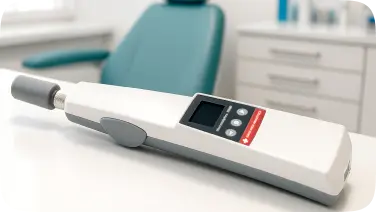
Meta Title:
Meta Description:
Analyse your metabolism, autonomic nervous system and stress response in detail with a thermoregulation test. Take the first step towards personalised health solutions.
Thermoregulation Measurement: Visualise Your Body's Balance
Every human body has its own internal balancing mechanism.
The system that controls this balance is called the autonomic nervous system.
However, we are often unaware of the state of this system. This is where thermoregulation measurement comes in.
The thermoregulation test analyses temperature changes in different parts of the body and provides detailed information about nervous system health, organ functions, and stress levels.
This scientific test allows you to understand your health not just based on how you feel, but also through measurable data.
What is a thermoregulation test?
Thermoregulation measurement is an advanced evaluation method that measures the functions and adaptation ability of the autonomic nervous system based on temperature changes at different points in the body.
Some of the systems the test focuses on:
- Autonomic nervous system (sympathetic & parasympathetic balance)
- Regulatory capacity of organ functions
- Lymphatic system and circulation
- Temperature changes related to hormone balance
- Disturbances in body heat distribution
This analysis provides preliminary information on issues such as chronic stress, circulatory disorders, lymphatic stagnation, thyroid and adrenal gland problems, and inflammation risk.
Who is it suitable for?
- Individuals experiencing chronic fatigue and stress
- Those suspected of having autonomic nervous system disorders
- Those with thyroid, adrenal gland, and hormonal issues
- Those prone to inflammation
- Those with migraines, fibromyalgia, and digestive system issues
- Those experiencing unexplained fatigue, sleep problems, and temperature fluctuations
How is it applied?
- Skin temperature is measured without contact in specific areas of the body.
- Short-term external environmental stimuli are applied during the test.
- Over 100 points on the body are analysed based on heat changes.
- Software-supported organ and system-based stress load and regulation capacity are evaluated.
Pre- and Post-Procedure Information
Before:
- Avoid caffeine, alcohol, and strenuous exercise on the day of the test.
- Do not measure on an empty stomach or after a heavy meal.
- Stress factors and sleep patterns are important on the day of the test.
After:
- Test results are evaluated by an expert.
- A personalised stress management, circulation support, and hormonal regulation plan can be prepared.
- If necessary, functional medicine, physiotherapy, or psychological support can be integrated.
- Test repetition is recommended every 6 months.
Frequently Asked Questions